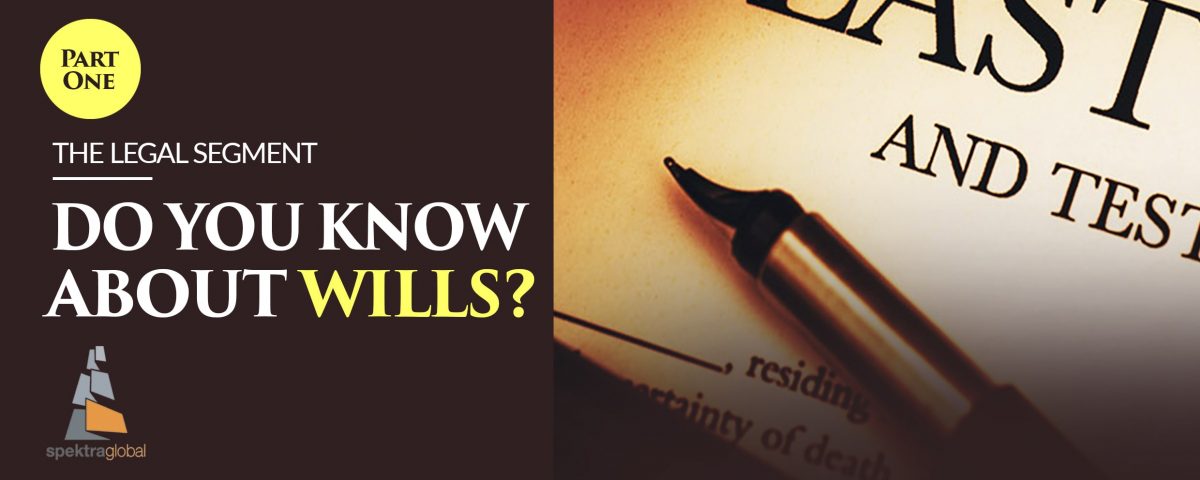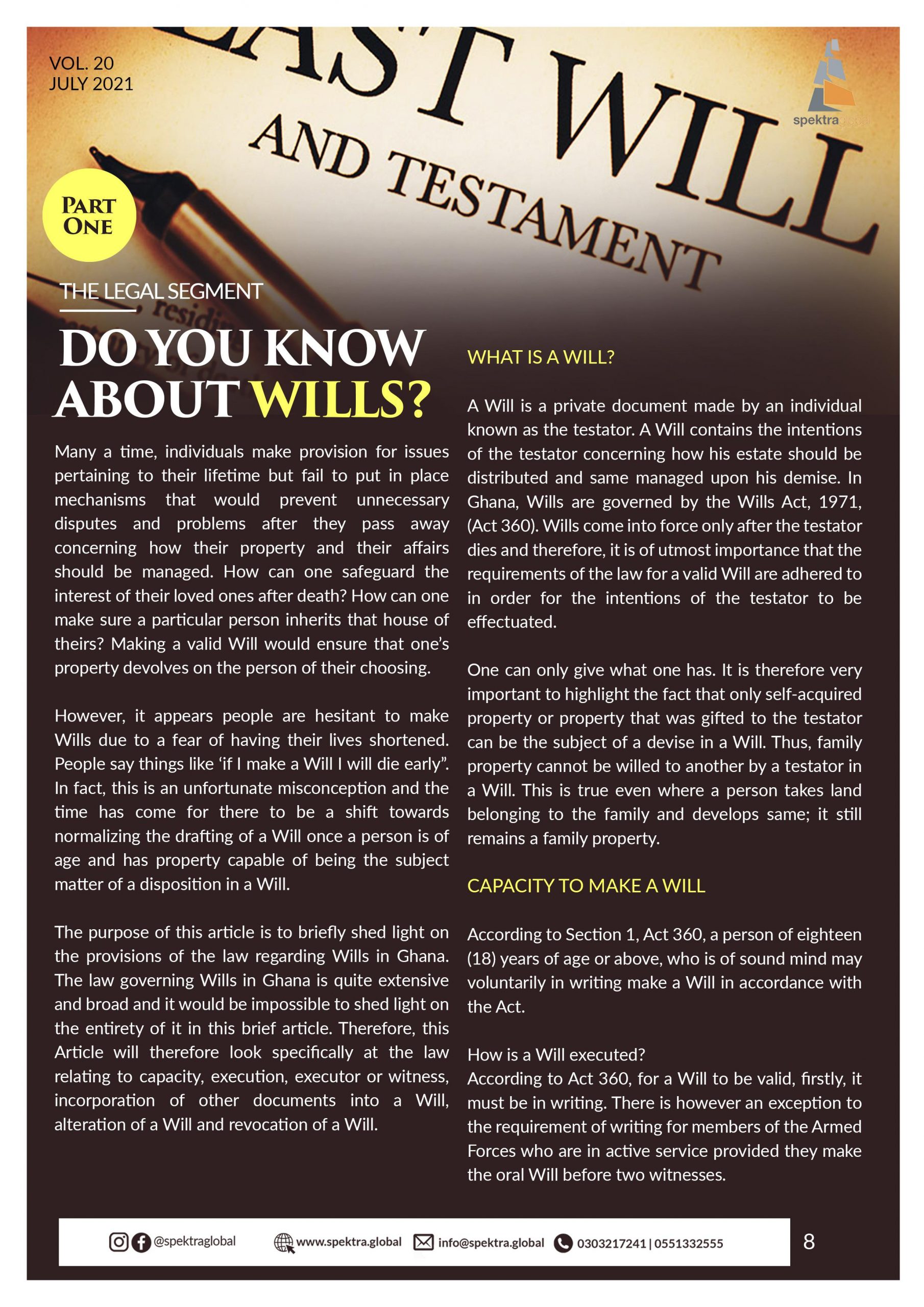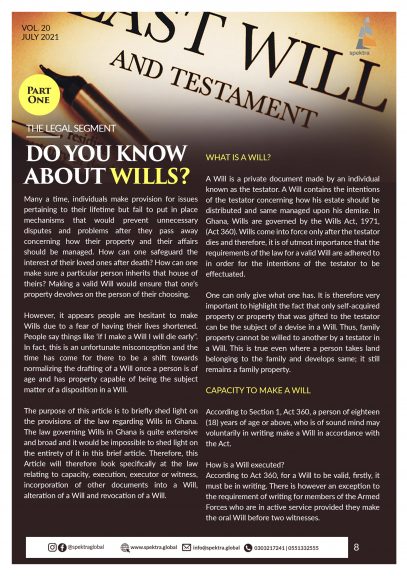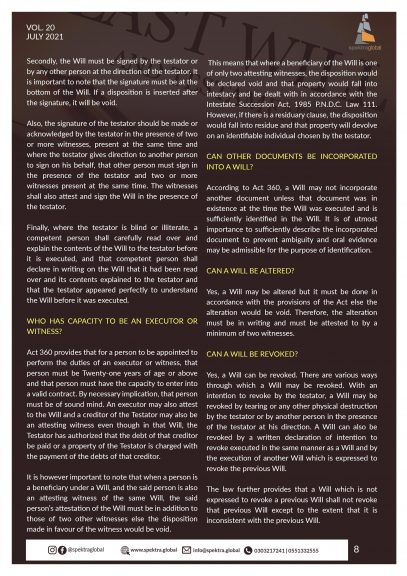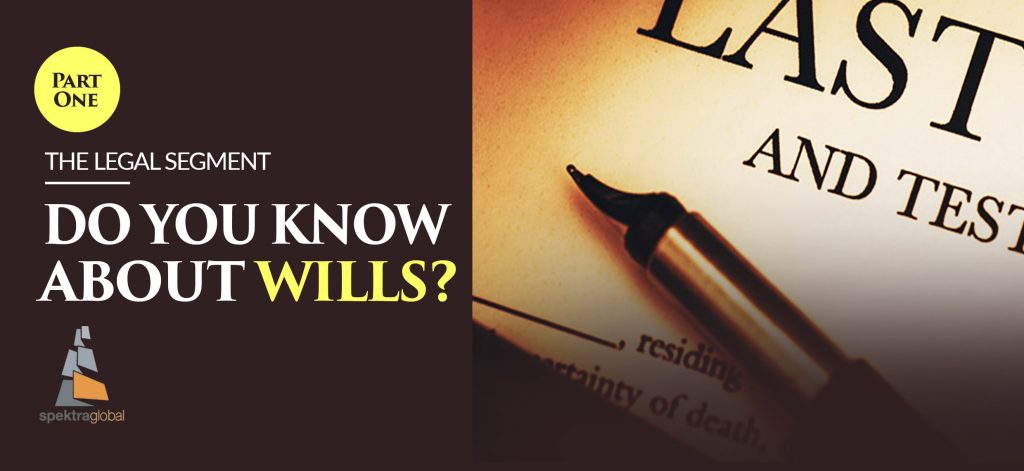
DO YOU KNOW ABOUT WILLS?
Part One
Many a time, individuals make provision for issues pertaining to their lifetime but fail to put in place mechanisms that would prevent unnecessary disputes and problems after they pass away concerning how their property and their affairs should be managed. How can one safeguard the interest of their loved ones after death? How can one make sure a particular person inherits that house of theirs? Making a valid Will would ensure that one’s property devolves on the person of their choosing.
However, it appears people are hesitant to make Wills due to a fear of having their lives shortened. People say things like ‘if I make a Will I will die early”. In fact, this is an unfortunate misconception and the time has come for there to be a shift towards normalizing the drafting of a Will once a person is of age and has property capable of being the subject matter of a disposition in a Will.
The purpose of this article is to briefly shed light on the provisions of the law regarding Wills in Ghana. The law governing Wills in Ghana is quite extensive and broad and it would be impossible to shed light on the entirety of it in this brief article. Therefore, this Article will therefore look specifically at the law relating to capacity, execution, executor or witness, incorporation of other documents into a Will, alteration of a Will and revocation of a Will.
What is a Will?
A Will is a private document made by an individual known as the testator. A Will contains the intentions of the testator concerning how his estate should be distributed and same managed upon his demise. In Ghana, Wills are governed by the Wills Act, 1971, (Act 360). Wills come into force only after the testator dies and therefore, it is of utmost importance that the requirements of the law for a valid Will are adhered to in order for the intentions of the testator to be effectuated.
One can only give what one has. It is therefore very important to highlight the fact that only self-acquired property or property that was gifted to the testator can be the subject of a devise in a Will. Thus, family property cannot be willed to another by a testator in a Will. This is true even where a person takes land belonging to the family and develops same; it still remains a family property.
Capacity to make a Will
According to Section 1, Act 360, a person of eighteen (18) years of age or above, who is of sound mind may voluntarily in writing make a Will in accordance with the Act.
How is a Will executed?
According to Act 360, for a Will to be valid, firstly, it must be in writing. There is however an exception to the requirement of writing for members of the Armed Forces who are in active service provided they make the oral Will before two witnesses.
Secondly, the Will must be signed by the testator or by any other person at the direction of the testator. It is important to note that the signature must be at the bottom of the Will. If a disposition is inserted after the signature, it will be void.
Also, the signature of the testator should be made or acknowledged by the testator in the presence of two or more witnesses, present at the same time and where the testator gives direction to another person to sign on his behalf, that other person must sign in the presence of the testator and two or more witnesses present at the same time. The witnesses shall also attest and sign the Will in the presence of the testator.
Finally, where the testator is blind or illiterate, a competent person shall carefully read over and explain the contents of the Will to the testator before it is executed, and that competent person shall declare in writing on the Will that it had been read over and its contents explained to the testator and that the testator appeared perfectly to understand the Will before it was executed.
Who has capacity to be an Executor or Witness?
Act 360 provides that for a person to be appointed to perform the duties of an executor or witness, that person must be Twenty-one years of age or above and that person must have the capacity to enter into a valid contract. By necessary implication, that person must be of sound mind. An executor may also attest to the Will and a creditor of the Testator may also be an attesting witness even though in that Will, the Testator has authorized that the debt of that creditor be paid or a property of the Testator is charged with the payment of the debts of that creditor.
It is however important to note that when a person is a beneficiary under a Will, and the said person is also an attesting witness of the same Will, the said person’s attestation of the Will must be in addition to those of two other witnesses else the disposition made in favour of the witness would be void. This means that where a beneficiary of the Will is one of only two attesting witnesses, the disposition would be declared void and that property would fall into intestacy and be dealt with in accordance with the Intestate Succession Act, 1985 P.N.D.C. Law 111. However, if there is a residuary clause, the disposition would fall into residue and that property will devolve on an identifiable individual chosen by the testator.
Can other documents be incorporated into a Will?
According to Act 360, a Will may not incorporate another document unless that document was in existence at the time the Will was executed and is sufficiently identified in the Will. It is of utmost importance to sufficiently describe the
incorporated document to prevent ambiguity and oral evidence may be admissible for the purpose of identification.
Can a Will Be Altered?
Yes, a Will may be altered but it must be done in accordance with the provisions of the Act else the alteration would be void. Therefore, the alteration must be in writing and must be attested to by a minimum of two witnesses.
Can a Will be revoked?
Yes, a Will can be revoked. There are various ways through which a Will may be revoked. With an intention to revoke by the testator, a Will may be revoked by tearing or any other physical destruction by the testator or by another person in the presence of the testator at his direction. A Will can also be revoked by a written declaration of intention to revoke executed in the same manner as a Will and by the execution of another Will which is expressed to revoke the previous Will.
The law further provides that a Will which is not expressed to revoke a previous Will shall not revoke that previous Will except to the extent that it is inconsistent with the previous Will.
It must be noted that when a Will is destroyed by a testator by reason of fraud or undue influence, or by mistake of fact or law intending to make another disposition of the property which is not validly made, the destruction of the Will would not operate as a valid revocation of the Will.
Conclusion
In conclusion, a Will contains the intentions of a testator, who should be 18 years and above, about how his estate should be distributed and managed upon his demise. Due to the technical nature of Wills and the fact that it only comes into effect when the testator dies, it is imperative to adhere strictly to the rules on execution of a Will since the testator would not be available to testify to its validity or correctness.
For a Will to be valid, it must be in writing and must be attested by a minimum of two witnesses. Attention must also be given to the witnesses and executors in terms of their ages and mental status. Another important key note is a beneficiary who doubles as a witness; it is advised that to avoid a disposition in favour of such a witness from falling into intestacy, it is best to rely on persons who do not benefit from the Will to act as witness.
In the next part to this article, we will shed light briefly on lapsed dispositions, revival of revoked Wills, armed forces Wills, custody of Wills, provisions for dependent’s, and disposal of life insurance money.
*Ethel Naa Adjekai Sowah Esq. (BL, LL. B, ACIM, BBA-Marketing) *

